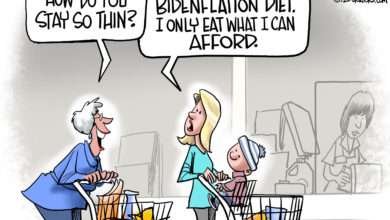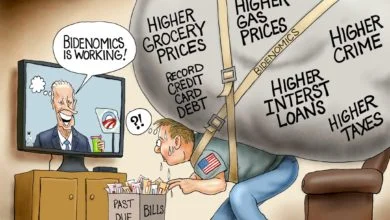Federal Reserve Signals Time to Pay Off Credit Debt
The average American is always trying to pay down their student loans and credit card debt, but the Federal Reserve has said that consumer borrowing jumped by a staggering 8.8 percent back in November, a surge that’s the biggest they’ve seen in two years.
Now is definitely the time for Americans to pay off their debts and here’s why.
Credit card debt has reached a whopping $3.8 trillion which may sound alarming, but evidence suggests that this debt is due to confidence rather than desperation or insolvency. Americans under Trump take a more positive view of the economy and are, therefore, more willing to borrow money.
Since the president’s inauguration, the stock market has boomed, GDP growth has improved and unemployment is the lowest it has been in 17 years.
With many companies voluntarily raising the minimum wage to $15 per hour and 163,000 jobs being added per month, most Americans are thriving like they haven’t in years. In other words, there is money to be made and, for this very reason, responsible Americans should take advantage of the opportunity to rid themselves of the debt that dogged them throughout the Great Recession.
With overall consumer debt reaching the highest level on record, it is critical that gainfully employed Americans do their part to lower the debt ceiling rather than over-extending themselves.
Bruce McClary of the National Foundation for Credit Counseling had this to say on the subject: “All indications that we’ve seen are that people are carrying higher balances from month-to-month and more are behind on their monthly payments. That’s not a healthy mix.”
For some of us, the prospect of paying off credit debt can seem complicated or even risky. There is a wealth of misinformation about paying off credit cards online. Many sites encourage people to consolidate all of their credit debt onto one low-rate card, but they fail to mention that rates go up astronomically after the first year.
Others end up trying to take shortcuts to pay down their debt. Chances are, you or someone you know has gotten in the habit of paying the minimum on a card. This is ill-advised because the cardholder never makes any headway and invariably ends up paying off the card for years and years to come.
Younger cardholders will often withdraw money from retirement accounts or plunder their emergency savings. Both of these methods make for problems down the road. This strategy can lead to the cardholder repeating the cycle during tough times.
Yes, you’ve paid down your credit card debt, but when disaster strikes you don’t have the funds you need to pay for car repairs or costly medical procedures. What inevitably happens is, the cardholder then charges these expenses to their card, placing themselves in credit debt all over again.
Dipping into home equity and taking out loans are also dangerous tactics taken to pay off debt and it rarely ends well for the consumer.
One of the simplest and most responsible strategies for lowering or eliminating credit debt is to trim regular spending so that spare cash can be used to cut the debt. This can be cumbersome for the working class, especially as rent prices go up and home maintenance expenses rise.
For this reason, seeking out a coach or accountability partner can be a sound investment. Some individuals can turn to their spouse to help them keep track of finances, but whether they take this approach or decide to hire an experienced credit counselor, it will be much easier to get out of debt.
For the glut of Americans who are in the process of buying a new home, credit cards can seem like an attractive way to keep your savings from dwindling, but AAACreditGuide urges new homeowners to consider a reputable mortgage lender before digging themselves into an even deeper hole.
The Federal Trade Commission has detailed how Americans can choose a credit counseling organization and thanks to their Telemarketing Sales Rule, debt relief services must be transparent about the fees they charge and the terms and conditions of using their service.
Some Americans forget to pay their bills on time because they get lost in the shuffle, but with paperless billing growing in popularity, there’s really no excuse. Some skeptics will point to online banking and the like as being less secure than paying their bill via check or in-person bank transfer.
With the rise of ransomware attacks on the rise, this has become an understandable concern. Banks and other financial institutions are particularly vulnerable to such attacks. Even Trump Hotel guests have had their credit card information hacked. Luckily, the public can take a page from President Trump and invest in a VPN (Virtual Private Network).
These heavily-encrypted online solutions can keep all of your banking activity private and anonymous. Using unique protocols and DNS leak protection, VPNs enable users to hide their IP addresses while paying bills online or surfing the web.
In this way, we should be able to make a dent, but first we must reexamine the numbers. The average American has at least three credit cards. In a robust economy where jobs are being created left and right, there is simply no need for so many lines of credit.
By avoiding cards with accumulated interest, putting all of our extra money toward our highest interest rate debt and utilizing a VPN with military-grade encryption to pay our bills securely online, we can ensure that we keep our heads above water.
We should all do well to follow the president’s example in the fiscal year ahead. As the economy flourishes so, too, should the people.




